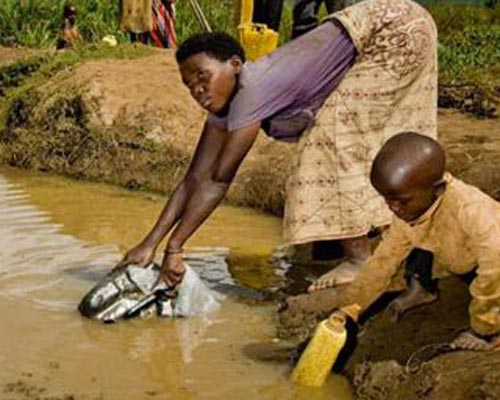
Sarudzai wakes up her two teenage sons to accompany her to search for water in the middle of the night.
Hazvinei Mwanaka
She collects a few empty buckets and prepares to leave in quest for the precious liquid.
The night is dusky and quiet with no movement of people on the streets except for tree shadows and a few vehicles speeding along Chitungwiza’s highways.
This has become routine for some women in urban Zimbabwe. Water shortages have reached critical levels and Chitungwiza town, which is about 25 kilometres from Harare, is no exception.
The town receives water once a week, but there are times when water does not run in the taps for several weeks.
Clean, safe and taped water has become an elusive commodity that is likely to expose residents to communicable water borne diseases.
Residents in this dormitory town have now resorted to unprotected sources as the local authority fails to come up with a lasting solution to these water woes.
- Chamisa under fire over US$120K donation
- Mavhunga puts DeMbare into Chibuku quarterfinals
- Pension funds bet on Cabora Bassa oilfields
- Councils defy govt fire tender directive
Keep Reading
Most residents have been reduced to late night water haulers, an exercise that places their lives in danger.
But the woman’s life is particularly at risk from robbers who seek their prey at night.
Current water supply from Harare is estimated at 600 mega litres of water per day against a daily demand of 1 400 liters and Chitungwiza needs 45 mega litres of water a day, but gets 30 mega litres.
Most women interviewed have said they are tired of the situation and most residents have begun drilling wells which, town clerk George Makunde is on record saying, have unsafe water for human consumption.
“We don’t normally encourage people to drill boreholes. The water table is high, and chances that the water could also be contaminated are also very high.
“Drilling boreholes is also a misnomer, but because of the water problems, we just encourage people to make sure that the water (from boreholes) is used for other things except drinking,” Makunde said.
Poor service delivery has also been on the decline, raw sewage flows freely along some streets. Uncollected garbage has also become an eyesore. One woman Tendai Garanga of Unit C said government and development agencies must intervene by drilling more boreholes to ease the water crisis.
“ We are now tired of the water challenges that we have in this town, we only get water once a week and sometimes never at all. If it does come, that will be in the late hours of the night. “I work during the day and spend the whole night looking for water.
“We urge government and development agencies to intervene as there is need of more boreholes in the town.
“There is no clear explanation as to why council is not supplying water,” she said.
A 70-year-old widow, Mbuya Mary James concurred with Tendai citing that the situation in Chitungwiza was now unbearable.
“I am not able to carry a bucket of water and walk long distances looking for water at night.
“We fear robbers as we usually leave our houses unattended as we go about in search of water,” the elderly woman said.
Earlier this year, Harare City Council’s health director Prosper Chonzi said 33% of the boreholes in Harare were contaminated with faecal matter.
Statistics from Chitungwiza Health Services department also revealed that typhoid cases from July 2012 to June 2013 were 692 cases with 2 deaths. From the 692 cases, 324 were males and 368 were females.
Ministry of Health and Child Care’s weekly disease surveillance report, for week ending September 15 2013, indicates that 12 367 cases of diarrhoea and three deaths were recorded for that week.
More than 4 200 Zimbabweans succumbed to cholera from August 2008 to mid-2009 as contaminated water supplies spread the disease amid the country’s failing health care systems.
As the dire need for water rationing continues illegal water dealers have sprung up across the town.
Traders charge prices which range from $1 for 60 litres to for $95 for a 2 500-litre tank.
However, engineers have been hired from China to rehabilitate the capital’s water infrastructure.
But Harare city water Engineer Christopher Zvobgo said the Chinese experts were not a permanent solution to the city’s perennial water woes as they will only plug water leakages.
In an interview with NewsDay soon after the arrival of another batch of 15 Chinese engineers, Zvobgo said the rehabilitation of the water pipes would only reduce leakages and slightly improve supplies from the current 300 to 600 megalitres a day against the city’s normal daily requirement of 1 400 megalitres.
“We will not meet the required amount, but we will be able to supply about 600 megalitres a day and eliminate some losses (due to leakages),” Zvobgo said.
The shortages have also affected surrounding towns such as Norton and Chitungwiza which rely on water supplies from the capital city.
Recently Local Government minister Ignatius Chombo implemented a directive to urban and rural councils to write off debts accrued by residents between February 2009 and June 2013.
The directive was one of Zanu PF’s campaign platforms in the latter days of the July 31 election race which the party and its leader President Robert Mugabe, won with a landslide victory.











